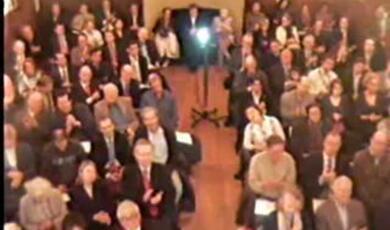Countering Extremism and the Politics of ‘Engagement’
Share
- Details
- Text
- Audio
- Downloads
- Extra Reading
This lecture surveys the range of government responses to extremism and terrorism. What are the different ideologies' at work in government thinking about engaging with Muslims? What impact are these contrasting approaches likely to have?
Download Text
COUNTERING EXTREMISM AND THE POLITICS OF 'ENGAGEMENT'
Professor Gwen Griffith-Dickson
Theology goes 'operational'
The boundaries between the 'theological' (the domain of religious communities to define and enforce) and the 'operational' (the domain of government and police to define and enforce) are breaking down when it comes to 'religious extremism'.
The most successful methods of intervention to prevent crime and ensure public safety may come to depend on theological intervention.
But conventional views suggest that religious beliefs should not be subject to interference by statutory bodies; nor should observance and enforcement of the law be left to the discretion of religious communities. The two domains are believed to be separate, each with its own jurisdiction.
This is in danger of becoming ever more confused - and contentious - as statutory agencies and Muslim communities work in closer partnership. This will be exacerbated if Muslim lay members become more involved in assessing operational matters and government, police and the security service become more involved in engaging with areas of religious belief and practice and supporting some views with the aim of hindering others. The differences between conventional police and security service assessment methodologies based on movements, associations, etc. may become intertwined with the assessment of religious beliefs as a risk factor.
This raises an immediate problem for civil liberties. The concept of 'prevent' suggests that the state or its proxies intervene before a crime has been committed. Analogies can be made with health, or social, psychological or educational problems: the earlier you intervene, the better; and prevention is better than cure.
This means that it is good practice to intervene well before there is any evidence of a plot to commit terrorist violence, or before other activities which are now criminalised, like glorification of terrorism or possessing terrorist manuals. But in the case of religiously-motivated violent extremism, what is the state before we have any evidence that a crime will be committed? How do we judge that state of risk? Is it not on the basis of the religious and political beliefs that are held by the individual? In that case, we are proposing that citizens become the subject of intervention for something that is not only legal - holding political and religious beliefs - but something that we also generally believe to be a human right.
If you think the problem of extremism is a problem about religious views, there are valid questions about what the government can legitimately do - at least under its own name. The prospect of government dictating what a religion ought to believe & teach would not be supported, I believe, by the majority of people in this country. A further question is how credible the government is as a religious 'voice'. Utterances by the former Prime Minister - 'Islam is a religion of peace' - provoked not inspiration but cynicism, both from Muslims and non-Muslims.
Engaging with the community
Whitehall has been sensitive to at least some of these issues. One response by various agencies has been to develop the concept and practice of 'community engagement', as a way of indirectly delivering effective action that it cannot do under its own authority. Instead of carrying out activities under its own name, it works in partnership with religious groups in order to achieve its objectives.
This raises a number of interesting questions. One might be, should government back or steer religious leaders? Do you back people currently operating effectively, or do you choose, train, thereafter steer them in some way to deliver what you need? Either of these could lead to potential embarrassments. The government back them, but it can't control them; what happens if they say something intemperate about Israel or illiberal about homosexuals? If you attempt to steer them, it means the theologically uneducated are dictating to the religious leaders - a quality assurance problem at least - but worse: it is probably the best way to undermine a religious leader's credibility in the community - particularly amongst the politically disaffected whom they most need to reach.
And there are greater risks than social ridicule. There seems to be a ministerial ritual whereby some minister periodically argues that the 'Muslim community should take more responsibility for countering extremism'. But counter-terrorism is a highly dangerous activity. What right have Whitehall departments to put private individuals at risk in order to deliver on government targets for national security?
Moreover counter-terrorism is a highly specialist activity as well as a dangerous one. To send citizens into such activity effectively as well as safely requires a secure evidence base for where intervention can be aimed, and what modes of intervention are effective. Do we have the knowledge and evidence base to know how best to go about it? How do you distinguish, for example between:
• Behaviour that is potentially offensive but does not represent a risk of criminal activity, safe to ignore
• Something that is potentially dangerous but nevertheless safe for Muslim community intervention
• Behaviour which indicates something dangerous, civilians should keep well clear and report it to authorities
Unfortunately, that is precisely what no-one knows. (Although increasingly some claim to.) We don't have enough evidence to reliably predict the outcomes of different kinds of behaviour, talk or beliefs. The science of countering radicalisation and extremism isn't 'mature'; we are at a 'pre-scientific stage' in this field, where many have opinions but none has proof. And that requires serious acknowledgement if we are asking citizens to take risks with their personal safety.
There seems to me to an inappropriate two-way delegation at times: ministers delegate policing and CT activity to the civilian community, while appropriating to themselves the right to steer theology and developments of a religion - 'Moderate Islam'. Whatever 'Muslim engagement' means, I suggest it is best that it does not mean this.
Finding the perfect partner?
But there is one fundamental challenge to 'Muslim engagement' or forming partnerships or finding proxies to carry out your counter-radicalisation work. It is both a practical and a 'philosophical' question. Who do you partner with? On what basis do you choose them?
As funding has mushroomed and new unites are created and rapidly expanded, numerous people are recruited who have no prior knowledge of Islam, or perhaps some of the convolutions of religion in general. This must be extremely difficult for civil servants and they have my sympathies. Islam - like the other venerable religions - is extremely complex. Some of us have spent decades studying it - and we've never had to make a policy decision based on it. They do, based on what must be a very steep learning curve. What's the difference between a Sufi and a Salafi, Islam and Islamism - and then once you've struggled with all that religious lore, they turn around and tell you it's all about foreign policy?
One way to cope when you have too much to learn in too short a time is to take shortcuts in the learning. The most fundamental shortcut in human nature is - to put it more bluntly than any civil servant ever would - 'good guys' and 'bad guys'. One common shortcut in vogue in the last few years is 'Sufi good, Salafi / Islamist bad.' (Salafi is a denomination within Islam.) It doesn't surprise me therefore that we have heard, for example, that only groups that are 'moderate' will receive funding, or see that 'Sufi' groups are the ones who enjoy the rights of the first born while the 'Islamists' are thrown out without an inheritance.
This shortcut then is based on assigning 'extremism' to one denomination (Salafi). - Stop and imagine for a moment: would we ever hear that the Minister for the DCLG is going to back Reform Judaism and refuse to fund projects associated with Orthodox Jewry ... ?
There are interesting implications if the government is deciding to support - with very tangible financial support - certain religious denominations to the exclusion of others. What if this shifts the internal balance of a religion? Let's not forget the law of unintended consequences; what are the long-term consequences of altering the internal balances of a religion and its denominations by injecting financial resources into one particular subgroup? And of course there is a fundamental question for civil society: what right does the government have to direct the theological developments of an entire religion?
So who does the government engage with?
My observations are that there are quite striking cultural differences between government departments, and departments and police, over whom, to 'engage'. Here are the leading candidates:
• Foster 'moderates' who will promote the right kind of Islam
• Encourage the development of an own-brand British Islam that has no problem with British secularism & modernity
• Find the people with the most insider knowledge and best credibility and hope to gain influence, even if they are 'Islamists'
• Find the most operationally effective people and empower them without making theological judgments about their interpretation of Islam, whatever their religious ideology
Each of these is open to challenge - vigorously - by media, commentariat, public intellectuals as well as the Muslim community itself. The first two have led to cynicism in the Muslim community and are criticised for being ineffective; moderates and secularist or modernist Muslims are those least respected by the young radicals and extremists whom they have to persuade. The latter two strategies have been targeted for attack by media commentators, think tank pundits and the blogosphere, which only increases government nervousness about who they should be seen to be engaging with.
So, for example, while she was minister of the DCLG Ruth Kelly made it clear she would only deal with 'moderate Muslims' [strategy 1]. At the same time, journalist Martin Bright wrote a think-tank piece, and made a Channel 4 'Dispatches' programme, roundly denouncing the government for consorting with 'Islamists' [strategy 3]. Is one woman's Moderate another man's Islamist, or are there different strategies in operation in Whitehall? (In my view the latter.)
Meanwhile, more recently Seumas Milne in the Guardian gave space to the views and strategies of a particular unit of Special Branch counter-terrorism experts, the Muslim Contact Unit. Their strategy, as described by their founder in the article, is to 'work with credible Muslim figures to isolate and counter those prepared to support terror attacks' [strategy 4]. This includes 'Islamists' and 'Salafis'. 'Islamists can be powerful allies in the fight against al-Qaida influence. Our experience shows they can be the levers that help get young people away from the most dangerous positions', he says. The online comments on this piece are still glowing radioactively; and it has leaped across the barrier and escaped into the wild, and is propagating now on blog pages and forums. Meanwhile the MCU and this experienced practitioner in particular has been accused of suffering from 'ideological Stockholm Syndrome' by the right-leaning commentariat.
It's a little lesson to show what government departments and counter-terrorist practitioners have to fear. It isn't the terrorists - it's the feral media.
In my analysis, each of these four strategies rests on a view - in most cases, unconscious - of what the problem ultimately is.
Is violent extremism down to being the wrong kind of Islam? In that case you should partner with moderates. [Strategy 1]
Is it a case of religion gone toxic, due to a ghetto mentality and failure of integration? If you think so, then it is not surprising that you would try to encourage an own-label British Islam. [Strategy 2]
Or is Al-Qaida, or maybe Islamism, best understood as a socio-political movement? If that's the model of terorrism you're working with, you might well go for third option and work strategically with those who have influence in that movement.
If on the other hand you place high weight on the psychological, emotional, social factors involved that motivate and excite young men into joining such groups, you go for the fourth: who is credible and effective at working with these young people?
So who should the government engage with?
At the Lokahi Foundation, our experience and our research has led us to formulate three rules of thumb: deceptively simple. As you will appreciate by now, they go against the grain of some current assumptions.
1. Don't ask for the school - look for the style
2. Don't ask for 'moderates' - look for credentials
3. Don't ask for 'pluralism' - look for inclusion
1. Don't ask for the school - look for the style
Our analysis does not support the assumption that there is a denomination in Islam, like 'Sufis', that are automatically effective against radicalisation and extremism. Constructive and effective work can be found across the full range of traditions, trends and orientations in Islam. So too can ineffectual efforts. In countering radicalisation a programme run by 'Salafis' which meets the criteria for success we analysed will deliver more than a programme run by 'Sufis' that does not. Look at the style in which they engage with young people.
2. Don't ask for 'moderates' - look for credentials
Being a 'moderate Muslim', especially if judged by style of dress, facial hair, Westernised social manners and mores, etc. is an unreliable guide either to 'extremism' in political thinking or to their personal effectiveness in countering radicalisation and extremism.
Here I clearly would be out of favour with the newly launched Quilliam Foundation. In their policy document, they recommend:
'Encourage students and imams to wear clothes that ensure belonging to mainstream society, and not Pakistani ethnic attire... Islam requires modesty, not Arab or Pakistani clothing. We are not like Polish Jews that insist on wearing black clothes, unrelated to religion;' [p. 9]
It isn't often you can offend Pakistanis and Polish Jews in the very same utterance.
'Integration' - especially if judged by cultural or ethnic signals like dress - is an unreliable guide either to political views or to propensity for violence. Very traditional Muslims, who may dress as if they are still in Pakistan or Yemen, are often very apolitical and are averse to any kind of political activism. Still less is dress a reliable guide to how effective that person is at engaging with alienated and angry radical youth. That rests on a complex set of skills and experience that is not measured by the style of your trousers.
What is a far more reliable guide is the person's credentials, above all: whether they have scholarly authority that is widely accepted according to the norms of their particular tradition, school or madhab (this will differ from one to the next); and whether their personal character and conduct inspire respect from the Muslim community as well as from non-Muslims with whom they engage.
3. Don't look for pluralism - look for inclusion
Non-Muslims frequently take as their litmus test of 'tolerance' a willingness to accept other faiths or other traditions in Islam as all equally valid. This is theologically debatable in Islam; and it does not necessarily correlate with 'tolerance'. Nor is an espousal of pluralism a reliable sign of effectiveness in modelling tolerance for their followers and preventing and discouraging hate-behaviour. Some who do not theologically view other religions as reliable routes to salvation nevertheless are in practice respectful towards people of other faiths or other traditions within Islam, and keen on discouraging hostility to other groups.
Meanwhile, those who are extremists are often hostile to co-operation with non-Muslims and the involvement of 'kuffar' or unbelievers who are effective on the same ground. This can form a useful guideline: how far is the person or group willing to co-operate with non-Muslims in areas of shared concern? This is more reliable a test of a constructive approach than a theology of universal salvation or a belief that all religions are equal.
So for an effective partner in countering radicalisation and extremism, don't look for someone who preaches pluralism; look for someone who in their behaviour practices inclusion and tolerance. Are they willing to make common cause with non-Muslims on issues of shared concern? Do they encourage respect for people with views contrary to their own?
So what do you actually do?
So if those are guidelines to who to engage with, then what do you do?
Here of course we need to make explicit what is too often unconscious and assumed: that is, what is causing the problem? Many assume it is a problem of a religion gone toxic; but that is in my opinion too narrow a view. Other academics put forward a range of factors - interestingly, it usually mirrors whatever academic discipline or expertise they have themselves - alienation and social exclusion, lack of education, political grievances and foreign policy, identity crises and lack of integration and young Muslims find themselves belonging nowhere, generational problems as young people can't relate to the religion of their elders -- a long list.
The core problem is this: 'Extremism' and 'radicalisation' cover a vast range of things: behaviour, utterances, attitudes, world-views, beliefs. These span almost the whole of human existence: theological, political, social, psychological and emotional. Everything in human life is relevant to radicalisation. To consider it purely as a malfunction of religion, as many seem to, to me is misguided. But if so then a programme or an organisation that focuses only on religious issues, on religious problems and solutions, may not be very effective.
In my view a programme that meets the widest possible range of the young person's needs will have the greatest success.
One programme we are closely acquainted with has its starting point in holding weekly sporting sessions for young men; anyone needing more support can be identified and quietly receives it. Every week they have football and boxing sessions, free for anyone. On occasions as many as 100 young men turn up for the Saturday night football; the facilities aren't big enough so boys have to spend a lot of time waiting for their turn to play - which could cause problems in these kids. In this area of London, there are - or were - three different Muslim gangs; and their members are coming for the football with the rest. And yet they have never had a single serious incident of anti-social behaviour. In fact, after less than a year of this programme running, two of the gangs have effectively disbanded. But young men also more deeply involved in extremism have been re-connected with more healthy forms of belief and behaviour.
This programme and the off-pitch informal mentoring, counselling and support that the young men receive meets a number of needs beyond the religious. And that indicates something very important: the most effective programmes against radicalisation and violent extremism might be simultaneously just as effective against other social ailments, like gang violence.
Counter-terrorism - or counter-subversion?
I have one very deep concern about proposed programmes, however; ironically, those most focused on religious and political beliefs. Have we have moved away from detection and prevention of crime -- to attempting to alter beliefs, systems of thought...? Have we left behind counter-terrorism and moved into counter-subversion? Counter-subversion can be defined as 'that aspect of counterintelligence designed to detect, destroy, neutralize, or prevent subversive activities through the identification, exploitation, penetration, manipulation, deception, and repression of individuals, groups, or organizations conducting or suspected of conducting subversive activities.' (That definition originally comes from the US Department of Defence Dictionary of Military and Associated Terms.)
Counter-subversion is a very different ball-game to just good policing or encouraging responsible citizenship. It raises a host of other civil rights implications.
Some of my more paranoid fantasies could be illustrated with last week's policy document released by the Quilliam Foundation. It is a very mixed bag of recommendations, many of them comparatively anodyne, so I do not want to misguide you as to the tenor of their package as a whole. Nevertheless, these recommendations are present:
'The immediate setting up of well-resourced deradicalisation centres in key cities across Britain, staffed by mainstream Muslim scholars...who counter Islamist ideology with traditional, pluralistic Islam' [p. 3] 'The period spent in these centres must be substantial and exposure to genuine piety intense, to the extent where residents question... and are unable to defend...' [Islamist ideology] [p. 4] 'Rather than arrest upon suspicion of crime, we should identify potential terrorists (with support from family members and mosque congregations) and expose them, hopefully voluntarily, to genuine religiosity, and explain to them their misunderstanding of Muslim scripture' [emphasis mine] [p. 3]
I'm not sure what the legal standing of these proposals are. If the intervention is carried out only 'hopefully voluntarily' then apparently they do not deem consent is not necessary. And if it is residential - apparently without consent in at least some cases, it is hard to see that such an intervention would not fall afoul of the law - or at least, lawsuits if the 'treatment' didn't work and an angry victim decided to sue.
Of course these sorts of techniques are not original. Intensive 'interventions' of this kind of a political nature were a focus of great interest (and research) in certain countries in the latter half of the twentieth century. Other such interventions, dubbed 'deprogramming', were attempted in the USA for members of religious cults in the 1970s and 1980s; but ran aground in legal and ethical quagmires and were replaced with the milder versions like 'exit counselling'. But these proposals in fact raise more ethical questions, 'deprogramming' itself because they go further. The American deprogrammers simply wanted to deconstruct and get rid of the undesirable religion. Here the proposal is toinstil a religious attitude, interpretation or set of beliefs not held by the subject at the start of the intervention ('exposure to genuine piety' and so on).
The legal and ethical implications are serious. But the likely effectiveness of the technique is also fatally compromised.
Two approaches compared
If the government has different models of engagement, even more diverse and colourful is the marketplace of emergent deradicalisation techniques. Between these different new programmes there are fundamental differences in the underlying philosophy, the psychology even, as in the manifest strategy. I will illustrate this by contrasting the strategies - one might almost say the personalities - of the Quilliam Foundation's proposals for countering extremism on university campuses with a new programme called Campusalam. Campusalam is a new social movement with its point of origin in a website, full of information on Islam as well as practical life skills, and advice on handling tricky situations for both students and staff. It has a section on extremism on the website. I must declare an interest as Campusalam has come from our stable, The Lokahi Foundation.
These are the recommendations from the Quilliam Foundation for what should happen on campus:
'...University authorities should actively monitor which Muslim faction controls the Islamic society and content of Friday sermons'
• 'Radical sermonizers should be actively rejected by Muslim student bodies, and not given succour'
• 'Leaders of FOSIS have a duty to help integrate its student population into British life, not encourage Saudi-style gender segregation'
• 'Muslim students should not takeover multi-faith prayer rooms and then create "Muslim-only" areas'
• 'University authorities should ensure prayer rooms do not become an Islamist underworld'
• '...University management should conduct spot checks on the content of ...lectures/sermons until sufficient trust in the Islamic society is re-established'
[Quoted/summarised from their policy document, pp. 10-11]
Campusalam has ten pages on extremism, as well as some scenarios with advice; so I will confine myself to a short summary to illustrate the approach.
• Destructive activity happens 'below the radar' of university staff, so strengthen and empower students themselves
• Support a reliable and sound understanding of Islamic teachings and interpretations in their diversity, encourage critical thinking skills
• Improve skills in social contacts; give students the dexterity and confidence to resist manipulative or destructive people
• Encourage good management of extra-curricular events on campus so that aggressive or destructive influences can't gain a foothold in meetings or religious gatherings
• Increase awareness of the political issues, encourage a healthy and flourishing debate of a full range of opinions, putting them to the test of rigorous enquiry and critical challenge
• Building trust is vital: key academic leaders should form good relationships with student body
• Create a positive atmosphere rather than create an atmosphere of suspicion, scrutiny, repression. It is also the best way to encourage 'integration' and the participation of Muslim students in the life of the university. This includes willingness to listen and understand, attention to needs, fairness & equality, respect, commitment to act on Muslim students' concerns, two-way trust, understanding legitimate political activism
• Discourage 'us-them' thinking of extremism by making sure that everyone feels included in the 'us'.
• Build supportive networks to help any students feeling threatened or pressured
• Maintain good relationships: be willing to listen, and keep listening until you really understand, create common ground, don't pursue your own agenda but listen to students' agenda, maintain an atmosphere of respect and trust, ask for their help and be willing to back them when they need yours
• Enlist expert support from off-campus of people who understand the issues and can offer advice & guidance
As I have declared an interest, I won't examine these two approaches critically; I will leave it to you to assess their differences, their comparative weaknesses and strengths.
Fence Britain with justice?
The unquestioned assumption at work in much of the activity we see around us is this. It's all about the 'content' - the content of what people believe, religiously and politically; and these ideas are driving them to a terrifying conclusion. This is a war of ideas, so we should support the right ideology; it is the content of the ideas that is dangerous, and therefore you wage the war of ideas by attacking or suppressing the enemy ideology and promoting content supportive of your own ideology. This is the thinking that believes that 'winning hearts and minds' is a matter of propaganda.
But it is this assumption that gives rise, potentially, to serious problems of civil liberties. And if it is wrong, it is not just ineffective. It is counter-productive, or even destructive. Counter-terrorist actions always come at a cost; there is always some 'blowback', to use the CIA term, some unintended and unwanted impact of your action, usually on the community.
But what if you take an approach that focuses on the many drivers that lure young people into extremism? If you don't attack their beliefs aggressively? Focus on their many needs, and find positive and empowering ways to meet them. Invite them in an atmosphere of trust and respect to think through their beliefs for themselves, with critical support. This is the thinking that believes you win hearts and minds in a very different way. You win minds by standing up for justice; you win hearts by showing understanding and directing people's feet into positive paths.
There is a story about the Caliph Omar in the earliest days of Islam. The governor of Cairo asked him what he should do about the thieves and brigands that were attacking Cairo relentlessly. 'Should I build a great fence around Cairo to protect it?' he asked. Omar answered: 'Fence Cairo with justice.'
Several programmes in existence follow this more unusual strategy. The programme of counselling and mentoring that starts with football that I mentioned earlier is like this. Campusalam is like this.
The fascinating prospect if you follow this strategy is that this is, uniquely, is an effective counter-terrorist action with no 'blowback' - no negatives for community, only positives. You are not treating them with suspicion, subjecting them to surveillance or intrusive supervision, or putting them under pressure - all of which increase grievances, alienation and disaffection in communities. Instead, you are supporting and empowering young people in what they want to become.
Sometimes we find the most enlightened answers by looking in the wrong place. You probably think this is a crazy suggestion, so I'll end with a crazy story.
Mullah Nasruddin was a popular figure in folk tales throughout the Middle East. Sometimes he appears as a wise man, sometimes he appears as a fool; sometimes it's hard to know which he is! This story is like that.
Mullah Nasruddin's neighbour came upon him on all fours down in the dust in the lane outside his house. 'Mullah, what is wrong?! Are you all right?'
'I've lost the key to my house! I can't find it! I've looked and looked!'
So the neighbour got down on his hands and knees too and began searching with Mullah Nasruddin.
After a whole hour, he still had no success. Finally he sat back on his heels and said, 'Mullah, this is no use. Can't you remember exactly where you were when you lost it?'
And Mullah Nasruddin said, 'Oh, of course I can! I was inside. I lost it in my house.'
'But Mullah!' exclaimed his neighbour in frustration. 'Why are we looking outside her ein the lane? Why aren't you looking for the key in your house? Why aren't we looking where you lost it?'
And Mullah answered, 'Because there's more light outside.'
Sources
The Lokahi Foundation: www.lokahi.org.uk
Campusalam: www.campusalam.org
Seumas Milne, 'We need to listen to the man from special branch', The Guardian, Thursday 14 February 2008.
Martin Bright, 'When Progressives Treat with Reactionaries' The British State's flirtation with radical Islamism' Policy Exchange, July 2006.
The Quilliam Foundation, 'Pulling Together to Defeat Terror. Recommendations for Uprooting Islamist Extremism.' April 2008.www.quilliamfoundation.org
©Professor Gwen Griffith-Dickson, Gresham College, 29 April 2008
This event was on Tue, 29 Apr 2008
Support Gresham
Gresham College has offered an outstanding education to the public free of charge for over 400 years. Today, Gresham College plays an important role in fostering a love of learning and a greater understanding of ourselves and the world around us. Your donation will help to widen our reach and to broaden our audience, allowing more people to benefit from a high-quality education from some of the brightest minds.


 Login
Login







